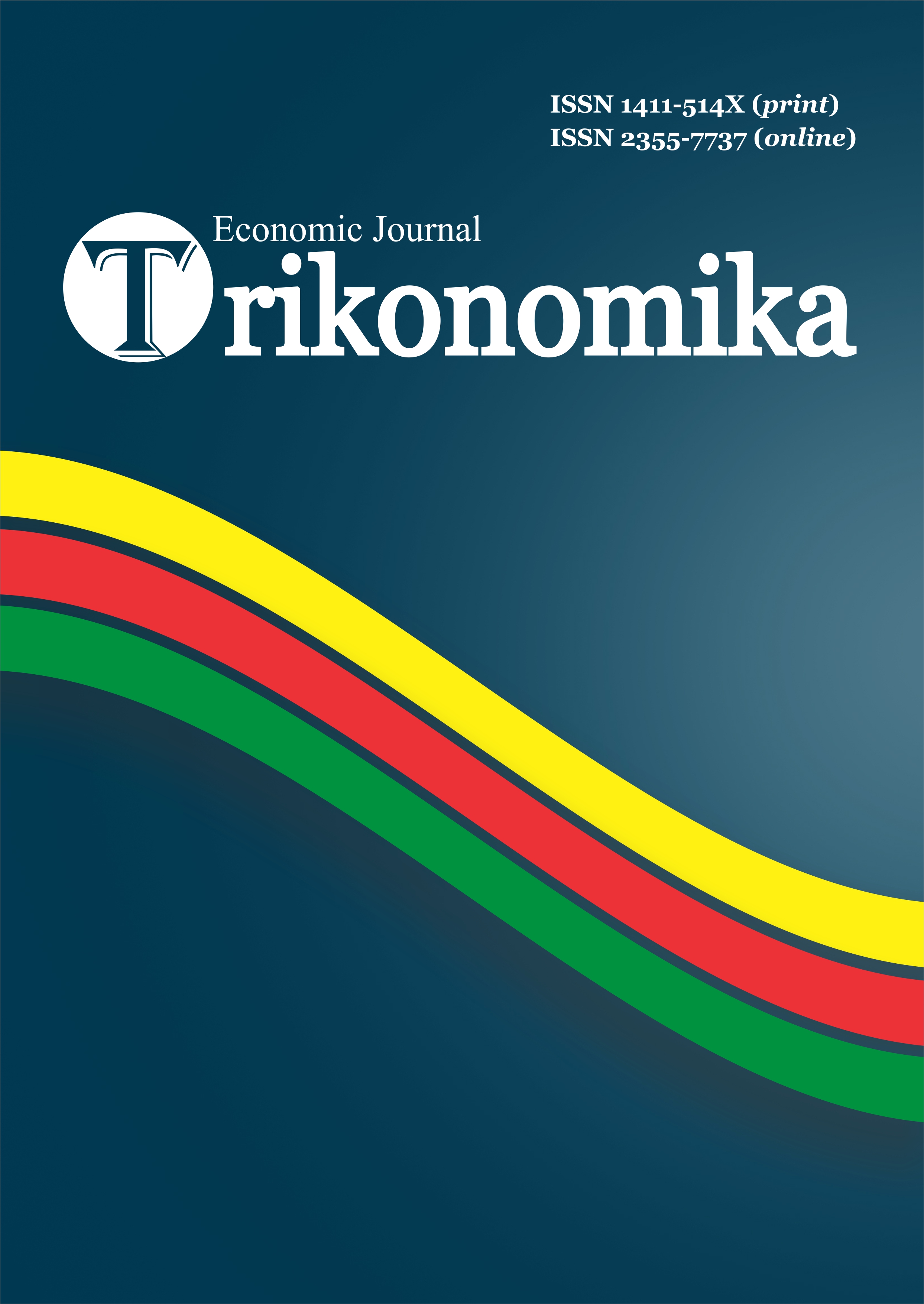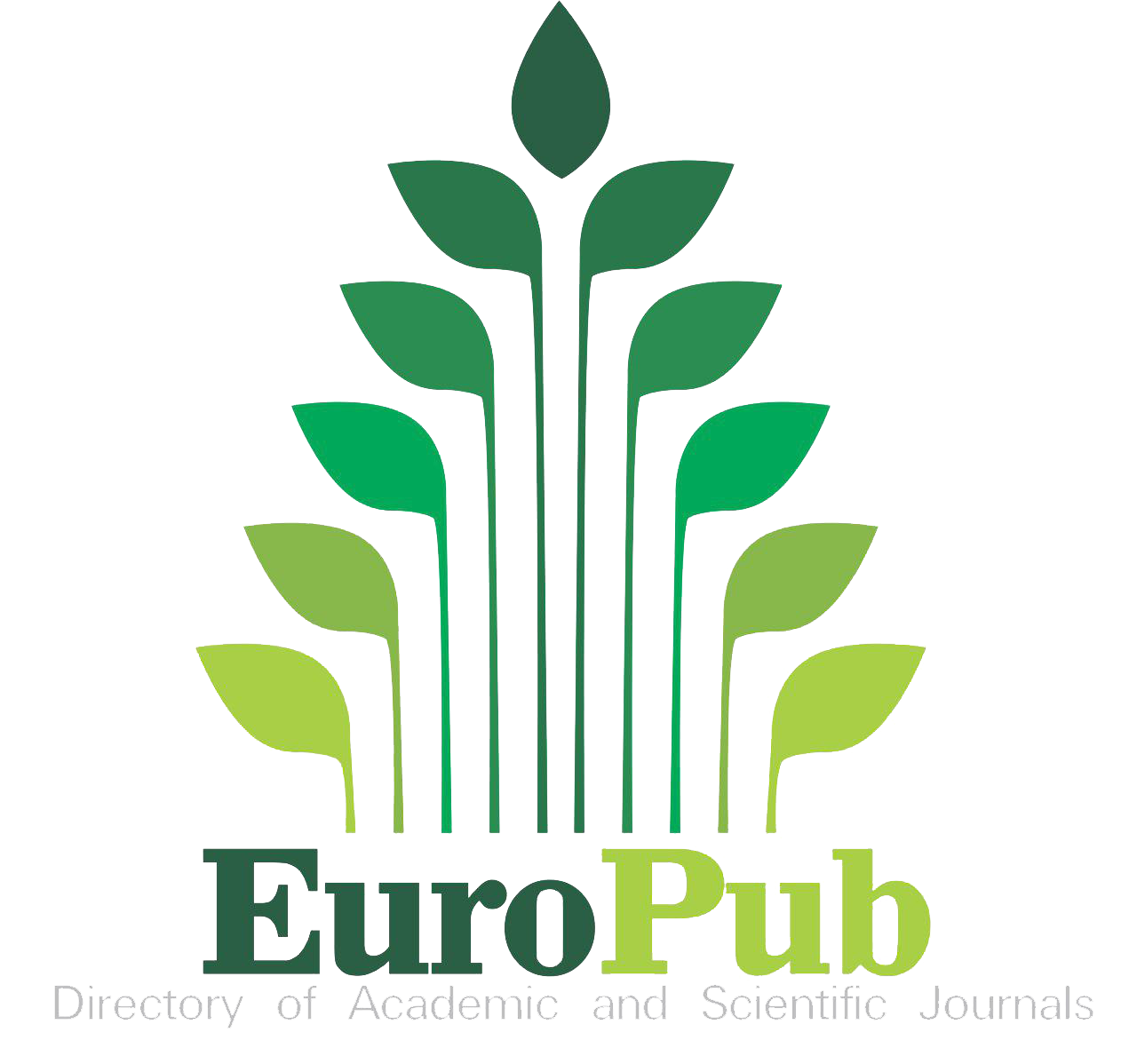ECONOMIC GROWTH AND POVERTY: THE MODERATING EFFECT OF INCOME INEQUALITY
DOI:
https://doi.org/10.23969/trikonomika.v23i1.9242Keywords:
Economic Growth, Poverty, Income Inequality, Moderating VariableAbstract
The trickle-down effect assumes that the progress of a group of people will automatically trickle down, thus creating jobs which in turn will promote the necessary conditions for equitable economic growth. However, previous studies on the association between economic growth and poverty have shown inconclusive results.This study fills the gap of the above research differences by introducing income inequality as a moderating variable in the relationship between economic growth and poverty. Secondary data from 34 provinces in Indonesia during 2016-2020 period were analyzed using panel data moderated regression. The results showed that while simple linear regression model indicates positive significant effect of economic growth on poverty, the interaction between economic growth and income inequality shows negative significant effect on poverty. This paper concludes that income inequality as measured by the Gini index moderates the effect of economic growth on poverty which supports the importance of inclusive economic growth.
Downloads
References
Afzal, M., Malik, M. E., Begum, I., Sarwar, K., & Fatima, H. 2012. Relationship Among Education, Poverty and Economic Growth in Pakistan: An Econometric Analysis. Journal of Elementary Education, 22(1), 23–45.
Aghion, P. and Bolton, P. 1997. A Theory Of Trickle-Down Growth And Development. Review of Economic Studies 64(2): 151-72.
Akinci, M. 2018. Inequality And Economic Growth: Trickle-Down Effect Revisited. Development Policy Review, 36, 1–24. https://doi.org/10.1111/dpr.12214
Alamanda. 2020. The Effect Of Government Expenditure On Income Inequality And Poverty in Indonesia. Info Artha 4(1), 1-11, https://doi.org/10.31092/jia.v4i1.614
Asongu, S. A., & Odhiambo, N. M. 2019. How Enhancing Information And Communication Technology Has Affected Inequality In Africa For Sustainable Development: An Empirical Investigation. Sustainable Development. https://doi.org/10.1002/sd.1929
Ayuniyyah, Q., Pramanik, A., Saad, N., & Ariffin, M. 2018. Zakat For Poverty Alleviation And Income Inequality Reduction: West Java, Indonesia. Journal of Islamic Monetary Economics and Finance, 4(1), 85 - 100. https://doi.org/10.21098/jimf.v4i1.767
Bashir, Abdel-Hameed M. 2018. Reducing Poverty And Income Inequalities: Current Approaches And Islamic Perspective. Journal of King Abdulaziz University: Islamic Economics, 31(1), 93-104. https://doi.org/ : 10.4197/Islec. 31-1.5
Basu, S., & Mallick, S. 2007. When Does Growth Trickle Down To The Poor? The Indian Case. Cambridge Journal of Economics, 32(3), 461–477. https://doi.org/10.1093/cje/bem053
Berardi, N., & Marzo, F. 2017. The Elasticity of Poverty with respect to Sectoral Growth in Africa. Review of Income and Wealth, 63(1), 147–168. https://doi.org/10.1111/roiw.12203
Dauda, R. S. 2017. Poverty and Economic Growth in Nigeria: Issues and Policies. Journal of Poverty, 21(1), 61–79. https://doi.org/10.1080/10875549.2016.1141383
De Silva, I., & Sumarto, S. 2014. Does Economic Growth Really Benefit the Poor? Income Distribution Dynamics and Pro-poor Growth in Indonesia. Bulletin of Indonesian Economic Studies, 50(2), 227–242. https://doi.org/10.1080/00074918.2014.938405
Doumbia, D. 2018. The Quest For Pro-Poor And Inclusive Growth: The Role Of Governance. Applied Economics, 1–22. doi:10.1080/00036846.2018.1529392
Gai, K. and Zhou, Y. 2022. Ownership, Trickle-Down Effect And Shared Development: A Political Economy Analysis. China Political Economy, 5(1), 52-71. https://doi.org/10.1108/CPE-10-2022-0015
Ghozali, I. 2011. Aplikasi Analisis Multivariate Dengan Program SPSS. Badan Penerbit Universitas Diponegoro.
Greenwood, D. T., & Holt, R. P. F. 2010. Growth, Inequality and Negative Trickle Down. Journal of Economic Issues, 44(2), 403–410. https://doi.org/10.2753/JEI0021-3624440212
Ho, S.-Y., & Iyke, B. N. 2017. Finance-Growth-Poverty Nexus: A Re-Assessment Of The Trickle-Down Hypothesis in China. Economic Change and Restructuring, 51(3), 221–247. doi:10.1007/s10644-017-9203-8
Kakwani, N., Neri, M. C., & Son, H. H. 2010. Linkages Between Pro-Poor Growth, Social Programs and Labor Market: The Recent Brazilian Experience. World Development, 38(6), 881–894. https://doi.org/10.1016/j.worlddev.2010.02.015
Kouadio, H.K & Gakpa, L-L. 2022. Do Economic Growth And Institutional Quality Reduce Poverty And Inequality in West Africa? Journal of Policy Modeling, 44(1), 41-63. https://doi.org/10.1016/j.jpolmod.2021.09.010
Kulkarni, V. S., & Gaiha, R. 2021. Beyond Piketty: A New Perspective On Poverty And Inequality in India. Journal of Policy Modeling, 43(2), 317–336. https://doi.org/10.1016/j.jpolmod.2020.10.003
Lee, N., & Rodríguez-Pose, A. 2016. Is There Trickle-Down from Tech? Poverty, Employment, and the High-Technology Multiplier in U.S. Cities. Annals of the American Association of Geographers, 106(5), 1114–1134. doi:10.1080/24694452.2016.1184081
Lee, N., & Sissons, P. 2016. Inclusive Growth? The Relationship Between Economic Growth And Poverty In British Cities. Environment and Planning A: Economy and Space, 48(11), 2317–2339. https://doi.org/10.1177/0308518X16656000
Mahadevan, R., & Suardi, S. 2019. Panel Evidence On The Impact Of Tourism Growth On Poverty, Poverty Gap And Income Inequality. Current Issues in Tourism, 22(3), 253–264. https://doi.org/10.1080/13683500.2017.1375901
Manaf, N. A. & Ibrahim, K. 2017. Poverty Reduction.
Mellor, J. W., & Malik, S. J. 2017. The Impact of Growth in Small Commercial Farm Productivity on Rural Poverty Reduction. World Development, 91, 1–10. https://doi.org/10.1016/j.worlddev.2016.09.004
Moore, J. D., & Donaldson, J. A. 2016. Human-Scale Economics: Economic Growth and Poverty Reduction in Northeastern Thailand. World Development, 85, 1–15. https://doi.org/10.1016/j.worlddev.2016.04.004
Muthia, A. 2019. Analisis Pro-poor Growth Melalui Identifikasi Pengaruh Pertumbuhan Ekonomi Terhadap Ketimpangan Pendapatan dan Kemiskinan Di Indonesia Tahun 2010-2015. Indonesian Journal of Applied Statistics, 2(2), 67. https://doi.org/10.13057/ijas.v2i2.34915
Nansandiqa, L., Masbar, R., Majid, M.S.A. 2019. Does Economic Growth Matter For Poverty Reduction in Indonesia? East Africal Scholars Journal of Economics, Business and Management, 2(2), 46-51. https://doi.org/ 10.36349/easjebm.2019.v02i02.002
Niyimbanira, F. 2017. Analysis Of The Impact Of Economic Growth On Income Inequality And Poverty in South Africa: The case of Mpumalanga Province, International Journal of Economics and Financial Issues, 7(4), 254-261.
Nyamweya, J. M., & Obuya, M. O. 2020. Role of Financial Efficiency and Income Distribution on the Relationship Between Economic Growth on Poverty Levels in East Africa Community Countries. International Journal of Finance and Banking Research, 6(4), 65. https://doi.org/10.11648/j.ijfbr.20200604.12
Omar, M.A. & Inaba, K. 2020. Does Financial Inclusion Reduce Poverty And Income Inequality In Developing Countries? A panel data analysis. Economic Structures 9, 37. https://doi.org/10.1186/s40008-020-00214-4
Pelizzo, R. & Kinyondo, A. 2018. Growth, Employment, Poverty And Inequality in Tanzania. Available at SSRN: https://ssrn.com/abstract=3241345 or http://dx.doi.org/10.2139/ssrn.3241345
Purnomo, S. D., & Istiqomah, I. 2019. Economic Growth and Poverty: The Mediating Effect of Employment. JEJAK, 12(1), 238–252. https://doi.org/10.15294/jejak.v12i1.18591
Rini, D.L & Tambunan, T.T.H. 2021. Inclusive Economic Growth of Indonesia and Its Determinants-Recent Evidence with Provincial Data. Asian Journal of Interdisciplinary Research, 4(1), 85-100. https://doi.org/10.34256/ajir2118
Sasmal, R., & Sasmal, J. 2016. Public Expenditure, Economic Growth And Poverty Alleviation. International Journal of Social Economics, 43(6), 604–618. https://doi.org/10.1108/IJSE-08-2014-0161
Sanders, P., Naidoo, Y., & Wong, M. 2022. Are Recent Trends In Poverty And Deprivation In Australia Consistent With Trickle-Down Effects? The Economic and Labour Relations Review, 33(3), https://doi.org/10.1177/10353046221112715
Sehrawat, M., & Giri, A. K. 2018. The Impact of Financial Development, Economic Growth, Income Inequality On Poverty: Evidence From India. Empirical Economics, 55(4), 1585–1602. https://doi.org/10.1007/s00181-017-1321-7
Seven, U., & Coskun, Y. 2016. Does Financial Development Reduce Income Inequality And Poverty? Evidence from emerging countries. Emerging Markets Review, 26, 34–63. doi:10.1016/j.ememar.2016.02.002
Škare, M., & Družeta, R. P. 2016. Poverty And Economic Growth: A Review. Technological and Economic Development of Economy, 22(1), 156–175. https://doi.org/10.3846/20294913.2015.1125965
Tsaurai, K. 2021. Is Economic Growth a Panacea for Poverty Reduction in Emerging Markets? The Journal of Developing Areas, 55(2). https://doi.org/10.1353/jda.2021.0041
Warr, P. 2018. Poverty Reduction and Economic Growth In Southeast Asia. Thailand and The World Economy, 36(1), 1–31. Retrieved from https://so05.tci-thaijo.org/index.php/TER/article/view/138754
Zhang, R., & Ben Naceur, S. 2019. Financial Development, Inequality, and Poverty: Some International Evidence. International Review of Economics & Finance 61, 1-16. https://doi.org/10.1016/j.iref.2018.12.015











